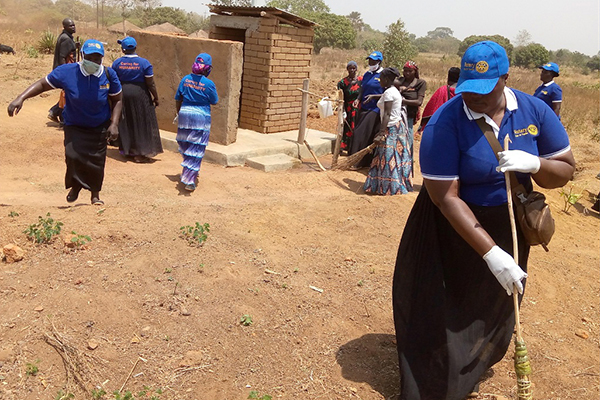
By Helene Dudley, past president of the Rotary Club of Coconut Grove, Florida, USA
My eyes filled with tears as I attended a Zoom meeting of the Yumbe, Uganda provisional Rotary Club discussing a service project they were planning to help a nearby village. I reached out in chat to another participant of the meeting who admitted she too was tearing up. The club is not yet officially recognized by Rotary International and the women are well below the poverty line but they are already doing service projects.
The 22 members of the Yumbe provisional Rotary Club are all leaders of Women’s Village Savings and Loan Association (VSLA) groups receiving funds from TCP Global to increase their loan pools. With regular loans to improve their businesses, their incomes increased so they can keep their kids in school and provide three meals a day.
Feeling they are already blessed by their regular access to loans (averaging $150), they decided their first service project should help a less fortunate community. After soliciting proposals from nearby villages, they opted to build latrines for a community that lacks sanitation.
I am continually surprised and sometimes shamed on my Zoom calls with Africa. I underestimate. I never stopped to question my initial assumption that VSLAs, made up of market vendors and subsistence farmers, lacked capacity for or interest in community projects.
These women are always ready to help others and CCEDUC is using its earnings to help them do just that.
While the usual TCP Global partner is a Non-Governmental Organization (NGO), the VSLAs are 30-member groups that combine their savings of $0.50 or so per week to provide loans to each other. They see the value of loans and want larger and more frequent loans, but without a bank account and internet capabilities, TCP Global could not work directly with them.
Care Community Education Center (CCEDUC) in Yumbe offered to serve as fiscal agent at no charge. In my mind that arrangement failed both the “Fair to all Concerned” and the “Beneficial to All Concerned” tests so I suggested that CCEDUC receive part of the earnings that usually go to the organization directly managing the loan program. If everyone benefits in some way from program success, everyone works hard for that success.
Although this arrangement proved to be fair and beneficial for all concerned and we now have 34 VSLAs receiving micro-loan funds with CCEDUC as fiscal agent, my underlying assumption was clearly wrong. These women are always ready to help others and CCEDUC is using its earnings to help them do just that.
Videos from African micro-loan partners include frequent requests to provide similar services to VSLAs in other communities. Within nine months of opening the first two loan programs in Yumbe, CCEDUC opened two loan programs in the BidiBidi camp for Sudanese refugees, 15 kilometers away. In these communities only 13% have home latrines, 48% have access to a safe water source and the average income is less than $2 per day. Yet their embrace of these refugees stands in stark contrast to the reaction of affluent U.S. citizens. We have a lot to learn from Africa.
About the author: Helene Dudley is Executive Director of TCP Global and a Returned Peace Corps Volunteer: Colombia 1968-70, Albania/Slovakia 1997-99
https://blog.rotary.org/2022/05/12/lessons-in-generosity-from-rural-africa/

